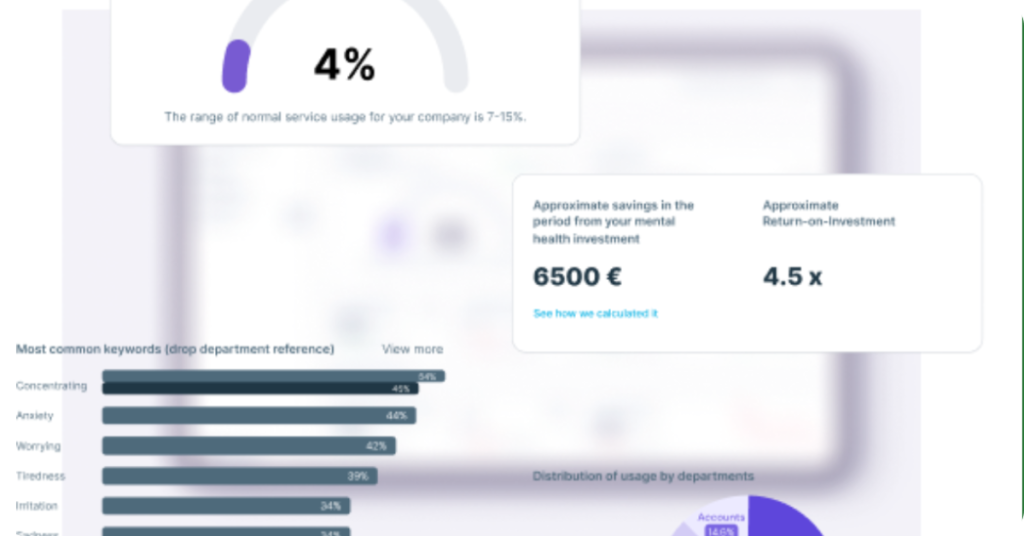6 Mental health stats every employer should take seriously

Passion might be what starts a lot of companies. ROI and KPIs are what drive them. We get it. Especially in times like these, it is essential to understand what we get out of our investments.
We also get that when we talk about “mental health”, we often think of “feelings and emotions”, which can make it uncomfortable and difficult to grasp and organize in neat little numbered boxes.
While mental health support in the workplace has moved from “nice to have” to “must have”, the need for concrete insights remains.
The privacy smokescreen
Let’s address the elephant in the room immediately: privacy.
The privacy concern is a popular argument for many insurance providers, claiming that this “delicate data” cannot be shared.
We at Siffi are not afraid to talk numbers. We, of course, understand and highly respect our users’ privacy. We are simply perfectly able to share relevant data with our clients.
We find it essential to show the real impact of mental health on companies’ productivity, and we help them use that data to become better.
15% of the working population live with mental disorder
According to the World Health Organisation, over 50% of the world population works. Among these 50%, 15% live with a mental disorder.
If we base our calculation on the 2022 figure of the world population, that means about 592 million people could be estimated to have a mental health disorder worldwide.
That is 1 in 13 people worldwide, working or not. If we go back to our working population, over 1 in 6 suffers from most likely depression, stress, or anxiety.
Consequently, chances are high that people on your team are suffering from some kind of mental health issue right now. You included.
12 billion working days are lost every year due to depression and anxiety alone.
That is estimated to be 1 trillion dollars lost in productivity per year.
12 billion, 1 trillion… We don’t know about you, but those numbers are so large that it is hard to grasp them. Let’s scale it down to a hypothetical company of 1000 employees.
If 12 billion working days are lost globally, out of 3.95 billion working people worldwide, that would be an average of 3 days per working person per year lost due to anxiety and depression and a loss of 250 dollars per person.
That is over 3000 working days lost for the 100-employee company, equaling more than 250,000 dollars lost annually.
Now those numbers are quite telling.
In the UK 61% of employees have left a job or are considering leaving a job because of poor mental health.
This is another piece of very telling data. Wellbeing and work-life balance are tipping the scale in the modern workplace. Millennials started the “trend” after too many burnouts, and Gen Z are definitely the generation for which mental health is a none negotiable.

Employees are giving much more thought and weight to those topics, and it is not all about salary, bonuses, corner offices, and other material perks anymore.
Indeed, according to the American Psychological Association survey, 92 percent of workers said it’s important to them to work for an organization that provides support for employee mental health.
People have realized in the past few years that true job satisfaction does not only lie with monetary gain but also with personal growth, and companies need to keep up with that shift to stay relevant and continue to attract and keep talent.
People take more time off to recover from mental health issues than from other health issues.
It is so obvious that we should have health insurance and in-house policies in place at work to avoid any accident that could cause a broken limb or a concussion and lead to sick leave and long recovery, translating into days off work and loss of productivity. Indeed, research by PWC shows that poor mental health is the main cause of long-term sick leave in the workplace.
And yet somehow, we struggle to put the same amount of effort into preventing mental health issues that can just as well find their roots in the workplace and, according to studies, take longer to recover from.
That is why it is so essential to cultivate a stigma-free company culture when it comes to mental health. Something that cannot be “one size fits all” but needs to be adapted to each company through training, workshops, surveys, and data gathering.
By leading by example, implementing the right policies, educating and training managers and employees, encouraging open communication and work-life balance, but also by normalizing self-care, providing resources, and making sure to constantly monitor and adapt.
The key role of training your teams
Only 13% of employees feel comfortable discussing mental health at work.
That means a staggering 87% – or 870 employees in a company of 1,000 – feel uncomfortable discussing how they feel at work.
Now that we understand how relevant this is to the overall well-being of the company, it is something we should aim to improve as a team.
Expecting your employees to come forward and volunteer personal information without any effort from the company is unrealistic.
Through mental health awareness programs, training for managers teaches how to practice active listening, normalize conversations around personal experiences and emotions, conduct regular check-ins, and celebrate vulnerability.
This is a process that does not happen overnight and requires ongoing attention and tailored calibration through regular check-ins via surveys and one-on-ones.
Up to 75% of employees would benefit from mild mental health activities in their organisation
According to McKinsey, 75 percent of all employees need some support to foster their mental health, such as resilience training, wellness programs, or community boosters.
24 of every 100 employees require moderate support, counseling, or peer support programs, while 1% of employees would need serious support and treatment.
What is interesting to note in McKinsey’s research is that employees move back and forth between these groups throughout their lives.
This demonstrates the importance of designing inclusive measures to address the needs of at least 75% of employees. Indeed, prioritizing comprehensive mental health approaches for the majority’s benefit together with the right partner is not only the right way; it also prevents dealing with hard consequences later.
A third of managers do not feel confident supporting their teams with mental health concerns.
This is completely understandable, but it does not have to be irreversible.
What we do not know tends to scare us. The good news is that knowing how to handle conversations around mental health in the workplace is something that can be learned and practiced.
This is where we at Siffi can support your entire company with leadership training and put in place good practices to improve company culture.
Beyond diagnoses and providing counseling our goal is to help create the right environment where employees feel respected, supported, and encouraged to seek help when needed.
We do that by working together with the whole company to create a safe environment by raising awareness, providing resources, and teaching managers and leaders to lead by example and initiate open dialogue.
Making changes for the future
The last few years (especially post-COVID) have seen a paradigm shift when it comes to employee benefits. With the ever-more intertwined professional and personal lives, employees have started to place their (and their families) well-being above monetary perks.
Hooray insurance company has shared some data that caught our attention. Especially regarding why people found it difficult to implement changes to improve their mental health:
- 12% said lack of knowledge
- 11% said lack of support
- 9% said finances
This only comforts us in the fact that raising awareness and support within the workplace is essential. Keep in mind that it’s never too late to start building a mental health culture within an organisation.
With the right partners and through tools that are easily accessible to all whether it is in terms of cost or user-friendliness, you can quickly achieve significant results.
Related:
About the author

Anastassia Murašina
Consulting Psychologist at Siffi
Anastassia is a psychologist specializing in counselling psychology, workplace well-being, and group facilitation. She develops mental health strategies and tools for organizations, designs and delivers trainings, and helps teams create healthier, more supportive work environments.
Recent Posts
-
How to handle giving and receiving feedback during yearly performance interviews12 Jan 2026
-
What HR should really get from their wellbeing platform15 Dec 2025
-
From burnout to belonging: How mental health platforms reduce avoidable turnover08 Dec 2025
-
Comparing the top 6 digital mental health platforms for workplace wellbeing01 Dec 2025
Newsletter
Sign up for our newsletter and get monthly tips and tricks for better mental well-being from our certified therapists and coaches.
